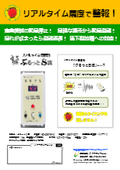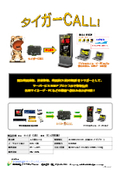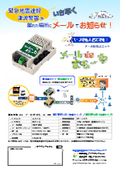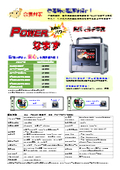Emergency Earthquake Alert Receiver "Mobile Mole" - Earthquake, Disaster Prevention, and BCP (Business Continuity Plan) Supplies
Mobile mole
The "mobile version" of the digital mole born from everyone's expectations.
When an emergency earthquake alert or tsunami warning is broadcast on FM radio, it automatically outputs the radio's sound. It is also convenient to carry and runs on dry batteries, so it always protects your safety by your side.
Inquire About This Product
basic information
- Being portable, it can be set up anywhere without hassle and is convenient to carry. Comes with a dedicated strap. - Can also use dry batteries, making it effective during power outages. Uses three AA batteries. - Receives information via FM radio waves, so there are no reception costs. - Quickly receives emergency earthquake alerts, tsunami warnings, and information on significant disasters. - Does not require an internet connection, making it usable in coastal and mountainous areas. - Can also be used as a radio, making it convenient for obtaining information after an earthquake or during disasters. - Its portable design features a sturdy body and a dedicated strap for easy transport. - When receiving emergency earthquake alerts and warnings, it automatically sounds the alarm at maximum volume. - The LED lights up when receiving emergency earthquake alerts and warnings, providing reassurance at night. - Built-in program displays automatic fault diagnosis on the LED. - Can be installed anywhere, either wall-mounted or placed on a surface. - Compatible with long-period seismic waves.
Price information
Standard selling price: ¥19,800 (excluding tax) Monthly maintenance cost: ¥0
Price range
P2
Delivery Time
P3
※Please contact us.
Applications/Examples of results
We implement earthquake measures to protect the safety of employees and customers by utilizing a nationwide sales maintenance network, numerous implementation achievements, and extensive experience in elevator control, automatic door control, security system control, in-house broadcasting through connection of broadcasting equipment, and other optional services in airports, hospitals, factories, warehouses, office buildings, public facilities, kindergartens, various schools, care facilities, hotels, and more. Commonly used industries include: Food and beverages, textiles, paper and pulp, chemicals, petroleum and coal products, rubber products, glass and stone products, wood, ceramics, resins and plastics, ferrous/non-ferrous metals, industrial machinery, robots, food machinery, mechanical elements and parts, consumer electrical appliances, industrial electrical equipment, electronic components and semiconductors, optical devices, automotive and transportation equipment, aerospace, shipbuilding and heavy machinery, testing, analysis and measurement, IT and telecommunications, software, CAD/CAM, environment, energy, medical devices, pharmaceuticals and biotechnology, architecture, civil engineering and engineering, building materials, supplies and fixtures, printing industry, manufacturing and processing contracting, other manufacturing, trading companies and wholesalers, retail, electricity, gas and water services, warehousing and transportation-related industries, information and communications, medical and welfare, education and research institutions, government agencies, fisheries and agriculture, mining, service industries, and others.
catalog(13)
Download All Catalogs
![[Implementation Results and Lineup] Earthquake Early Warning Receiver "Implementation results are a testament to trust"](https://image.www.ipros.com/public/catalog/image/01/729/490980/IPROS49230374233640226326.jpeg?w=120&h=170)
![[Comprehensive Brochure J Series] Emergency Earthquake Alert Receiver - Disaster Prevention Measures Starting from 0 Yen per Month (FM Type / Internet Type)](https://image.www.ipros.com/public/catalog/image/01/e12/601118/IPROS65307617697620945208.jpeg?w=120&h=170)
![[Advice on Choosing a Model] If you are selecting an emergency earthquake alert receiver, should you choose the FM type or the internet type?](https://image.www.ipros.com/public/catalog/image/01/5c7/601133/IPROS66003886338327241623.jpeg?w=120&h=170)
![[Comparison Table by Type] If you're choosing an emergency earthquake alert receiver, should you go for the FM type (general use) or the internet type (advanced use)?](https://image.www.ipros.com/public/catalog/image/01/035/601132/IPROS47100636317241110418.jpeg?w=120&h=170)




Company information
Our company has been involved in emergency earthquake alerts since the demonstration phase of the Japan Meteorological Agency's project that started in 2006. As a company that handles and sells emergency earthquake alert reception devices (earthquake alert reception terminals/earthquake alert receivers), P-wave seismometers, and S-wave seismometers, we take pride in being a leading company in emergency earthquake alerts and earthquake countermeasures, with extensive experience, technology related to external output device control, development of optional equipment, and public relations activities.

![[Comprehensive Proposal] Emergency Earthquake Alert Receiver {Explanation of Differences in Models}](https://image.www.ipros.com/public/catalog/image/01/8ff/490985/IPROS94056475217041361275.jpeg?w=120&h=170)












![[NETIS Registered Product] Single Pipe Barricade 'The Barricade'](https://image.www.ipros.com/public/product/image/2070280/IPROS2490309052512170556.png?w=280&h=280)